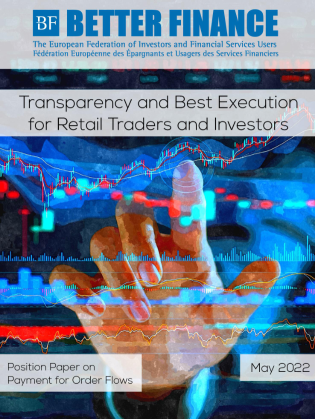 Member States have until 31 May to actively support transparent, efficient, and accessible equity markets for retail investors and submit their written comments to the French Presidency working on the Compromise Proposal for the review of MIFIR regulation. In order to avoid a poor compromise, national policymakers should put consumer interests first and remember the European Union’s Markets in Financial Instruments Directive (MiFID II) requirements for investment firms to act “honestly, fairly, and professionally in accordance with the best interests of clients” when providing investment services. MiFID II further stipulates that the receipt of an “inducement” (commission, rebate, fee or other monetary benefit) by an investment firm can lead to a situation in which the firm would not be acting in the best interest of its client.[1]
Member States have until 31 May to actively support transparent, efficient, and accessible equity markets for retail investors and submit their written comments to the French Presidency working on the Compromise Proposal for the review of MIFIR regulation. In order to avoid a poor compromise, national policymakers should put consumer interests first and remember the European Union’s Markets in Financial Instruments Directive (MiFID II) requirements for investment firms to act “honestly, fairly, and professionally in accordance with the best interests of clients” when providing investment services. MiFID II further stipulates that the receipt of an “inducement” (commission, rebate, fee or other monetary benefit) by an investment firm can lead to a situation in which the firm would not be acting in the best interest of its client.[1]
Payments for retail order flows (PFROF) are a clear example of such breaches of conduct of business rules reinforcing retail investor protection. Moreover, PFROF can conflict with best execution requirements and can lead to worse execution for end investors. Yet policymakers from EU Member States are poised to reject pro-consumer proposals by the European Commission, the European Securities and Markets Authority (ESMA) and BETTER FINANCE[2], to ban the practice of PFOF altogether.
Instead, the Council considers additional disclosures as a solution for PFOF concerns, which is in BETTER FINANCE’s view yet another blatant attempt to shift responsibility from providers to non-professional investors. The trend of essentially requiring “retail” investors to undertake their own research, engage in highly technical evaluations, and monitor complex market infrastructures to determine whether their providers comply with the law needs to be stopped in its tracks. Even academics, regulatory authorities, and industry players can’t agree on how to assess best execution, so how can we expect non-professional traders to do so? After all, investing is not, and should not be, a full-time job.
To ensure and evaluate “best execution”, “retail” investors need free, clear and easy access to market data - in essence a consolidated tape that allows for the ex-post verification of best execution - allowing investors to verify if orders have been executed in their best interest. Any trade execution venues handling “retail orders” must abide to the same transparency and matching rules as regulated markets.
“Dark venues should have a minimum order size threshold that would exclude retail trades,” says Guillaume Prache, Managing Director of BETTER FINANCE. “Otherwise, consolidation and display of pre- and post-trade data close to real time will only help dark, freeriding venues to further expand at the expense of the lit regulated markets. This would lead to the opposite of the CMU’s goal to foster retail investment into capital markets, leaving them increasingly in the hands of just professional intermediaries (“other people’s money”)”.
[1] Save where certain criteria are met.
[2] Transparency and Best Execution for Retail Traders and Investors, BETTER FINANCE Position Paper on Payment for Order Flows, May 2022
